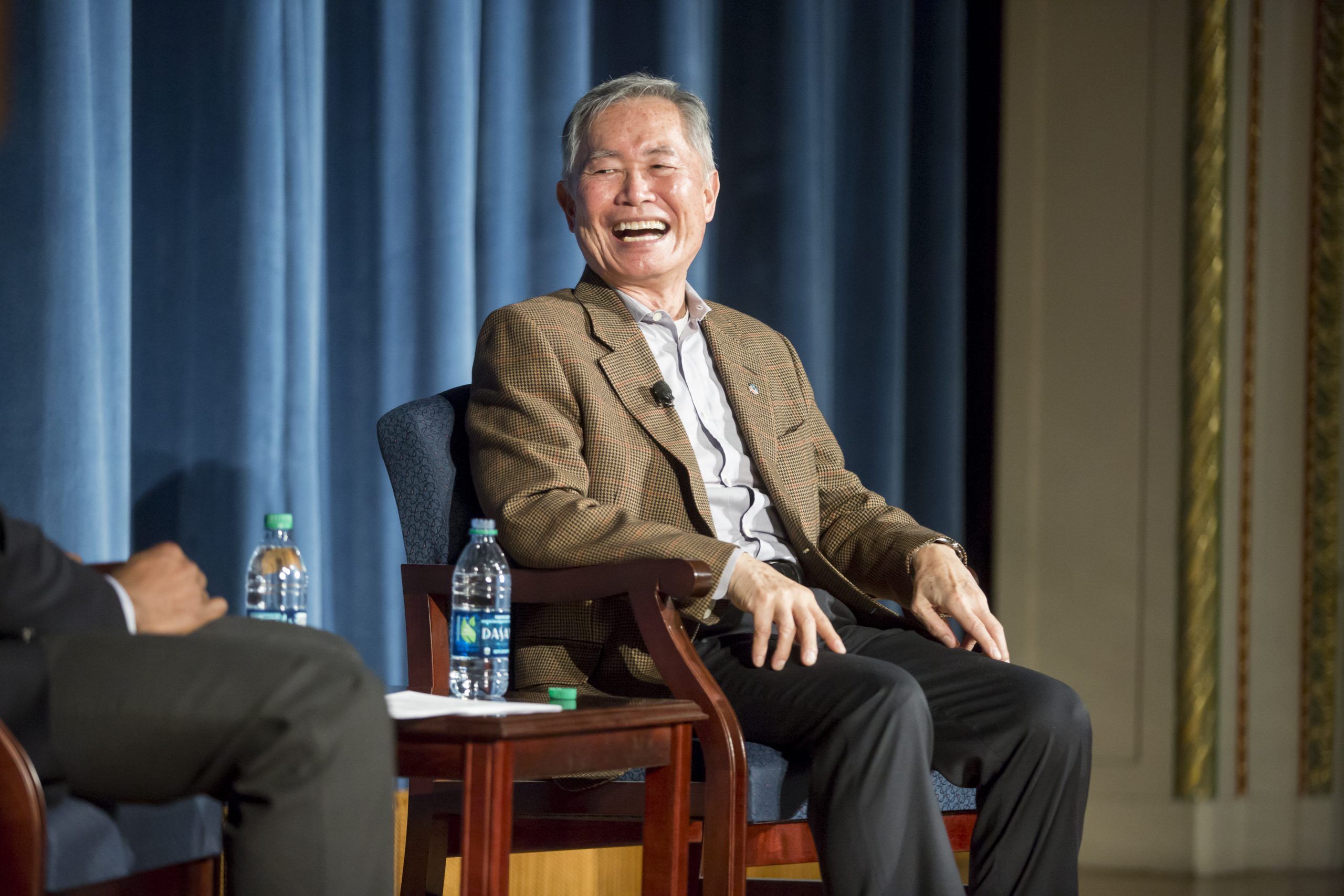
George Takei Speaks at I-House about “Allegiance,” Activism, Star Trek, and Social Media
Special guest speaker George Takei addressed I-House Residents in Davis Hall on February 1, 2016. I-House President Calvin Sims interviewed the actor, author, and activist, highlighting his achievements on television, his 9.5 million Facebook followers, and awards for human rights advocacy and Japanese-American relations.
Takei traced the origin of his current Broadway musical “Allegiance” to a sad time in American history when his family and 120,000 people of Japanese ancestry (the majority American citizens) were forced out of their homes and jobs and incarcerated, “with no due process or trial,” after the attack on Pearl Harbor. Takei remembers at five years old seeing two soldiers with bayonets approach their house in California and remove them. They were also given a mandatory “loyalty questionnaire” that resulted in their relocation to the maximum-security Tule Lake Segregation Center. (In other cases questionnaire respondents were forced to serve in the most dangerous campaigns in the army, suffering the highest losses per capita.) After the war ended, the Takei family was released from the segregation center and left to fend for themselves on Skid Row in Los Angeles.
Taking to heart his father’s words about America being a people’s democracy, in which “people are fallible, but in a democracy you don’t give up,” Takei became interested in politics during Governor of Illinois Adlai Stevenson’s presidential bid in 1952. He supported Dr. King and the Civil Rights movement and the peace movement. Some young Japanese people, Takei said, “by which I mean anyone under 60,” are learning for the first time about the internment from his musical “Allegiance,” in part because those affected were often reticent about their experiences, preferring to put it behind them.
Ever since he was a boy, Takei liked to perform. When his father at first discouraged him from being an actor, saying that Asians on TV played servants and villains, Takei responded, “I’m going to change that.” He wanted to study at the Actors Studio in New York, but his parents wanted him to get a diploma, so they offered to subsidize his studies if he studied acting at UCLA and graduate with a degree.
He spoke highly of Gene Roddenberry, the former beat cop who created “Star Trek” with an international crew. It featured an Asian man with none of the stereotypical film/television characteristics and no accent, who helmed the Enterprise capably (the name Sulu was taken from the Sulu Sea in the Philippines to represent all of Asia). The crew also had a Russian (during the Cold War), an African American woman (who took part in the first interracial kiss on television during the Civil Rights movement; the episode was canceled in the South), a Scottishman, and a half-human, half-Vulcan character. The Enterprise was a metaphor for Earth’s diversity at a time when television had little serious programming, despite compelling issues like the Vietnam War.
Apart from acting, he also served as a board director under Los Angeles Mayor Tom Bradley to initiate LA’s first subway system. Takei remained closeted to protect his career until the age of 68. He and his longtime partner Brad Altman came out after California Governor Arnold Schwarzenegger vetoed a same-sex marriage bill. George and Brad were the first gay couple to apply for a marriage license in West Hollywood. Despite Takei’s initial fears, when he came out, his career continued to soar.
In response to a resident question about his vast and influential social media presence, Takei said that it started as a personal blog for Trekkies. His online following grew when he started posting humorous content, including Grumpy Cat memes. Once his audience increased to include wider demographics beyond sci-fi fans, he started posting about some of his advocacy causes and his “Allegiance” show project.
Takei closed by saying how important it is to do what you love and are passionate about. For him, that includes acting, public service, and advocacy for human rights.